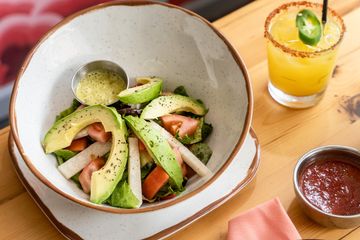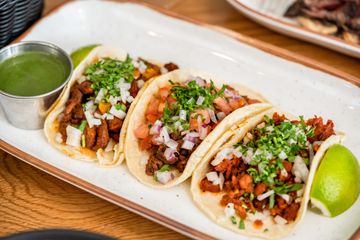Is Mexican Food Healthy And Balanced? Unloading the Nutritional Advantages of Typical Ingredients
The concern of whether Mexican food is healthy welcomes an exploration of its typical ingredients. Beans and corn work as foundational staples, abundant in protein and fiber. Avocados supply valuable fats, while different herbs and flavors include taste and health and wellness benefits - mexican food. Together, these elements produce a tapestry of nourishment. The healthiness of Mexican cuisine commonly depends on prep work methods and part dimensions. What role do these elements play in identifying its total nutritional value?
The Power of Beans: Protein and Fiber-Rich Staples
Although usually neglected, beans serve as a foundation of Mexican food, supplying a wealth of dietary advantages. Rich in protein, they are an outstanding plant-based option for those seeking to satisfy their dietary protein needs. This high healthy protein content sustains muscular tissue repair work and growth, making beans important for both meat-eaters and vegetarians alike. Furthermore, beans are a remarkable source of dietary fiber, which helps in digestion and promotes a feeling of volume, possibly aiding with weight monitoring.
The range of beans used in Mexican meals, such as black beans, pinto beans, and kidney beans, adds to a varied flavor profile and can enhance dishes nutritionally. Moreover, beans are low in fat and consist of essential vitamins and minerals, consisting of iron, folate, and magnesium. Together, these qualities make beans an important ingredient, supplying both nutrients and nutrition in standard Mexican fare.

Corn: a Versatile Grain With Nutritional Benefits
Corn sticks out as a flexible grain essential to Mexican cuisine, celebrated not just for its culinary applications but likewise for its outstanding dietary profile. As a main component in meals like tortillas, tamales, and pozole, corn gives necessary nutrients that contribute to a balanced diet plan. Rich in carbohydrates, it offers as a significant power resource, while additionally being low in fat, making it a positive alternative for various dietary needs.
Moreover, corn is a good source of dietary fiber, which helps in digestion and advertises satiation. It has considerable quantities of vitamins such as B-complex vitamins, which are vital for basal metabolism. The presence of antioxidants, especially carotenoids, adds to overall health by decreasing oxidative stress and anxiety. Additionally, corn is gluten-free, accommodating those with gluten level of sensitivities. In general, the nutritional benefits of corn emphasize its relevance in traditional Mexican food and its duty in a healthy diet regimen.
Avocados: Healthy Fats and Nutrients in Every Bite
Avocados play a considerable function in Mexican cuisine, complementing dishes with their creamy appearance and rich taste. Past their culinary appeal, avocados are celebrated for their remarkable dietary profile. They are a rich source of healthy and balanced monounsaturated fats, which can assist lower bad cholesterol degrees and assistance heart health and wellness. Furthermore, avocados are packed with essential vitamins and minerals, consisting of potassium, vitamin E, and B vitamins, adding to overall health.
The high fiber material in avocados help digestion and advertises satiation, making them a beneficial enhancement to any type of meal. Their one-of-a-kind nutrient structure can likewise support skin wellness and supply anti-inflammatory benefits. Including avocados right into conventional Mexican recipes or enjoying them as a standalone snack can improve both taste and nourishment, demonstrating why they are a precious staple in Mexican cuisine. On the whole, avocados supply a tasty way to appreciate healthy fats and i loved this critical nutrients in every bite.

Herbs and flavors: Flavorful Wellness Boosters
While enjoying the rich flavors of Mexican cuisine, one can not ignore the essential role that spices and herbs play in improving both preference and wellness. Ingredients such as oregano, chili, and cilantro peppers not just add to the vivid taste account but also supply significant wellness advantages. Cilantro is recognized for its cleansing residential properties, aiding to remove hefty metals from the this page body, while oregano is packed with antioxidants and has anti-inflammatory effects.
Chili peppers, a staple in numerous Mexican dishes, include capsaicin, which has been connected to boosted metabolic rate and pain relief. Furthermore, seasonings like cumin and coriander assistance food digestion and might help in blood glucose law. Including these delicious health and wellness boosters into dishes not just improves the culinary experience yet also promotes total wellness, making Mexican cuisine not simply tasty, but also nutritionally helpful.
Standard Cooking Approaches: Enhancing Nourishment and Flavor
Typical food preparation techniques in Mexican cuisine play a vital role in enhancing both nourishment and flavor, as they often focus on time-honored strategies and fresh components. Strategies such as nixtamalization, where corn is soaked and prepared in an alkaline option, not just improve the nutrient account of tortillas however also improve their digestibility - happy hour. Additionally, using slow food preparation approaches, like cooking or braising, allows tastes to combine magnificently while keeping the honesty of the ingredients

Often Asked Concerns
Are Mexican Food Portions Normally Larger Than Other Foods?
Mexican food parts are typically larger than those of several other foods. This characteristic mirrors standard dining practices, stressing common sharing and hearty dishes, which can cause a more significant serving dimension in general.
Exactly how Does the Prep Work Technique Affect Healthfulness of Mexican Food?
Preparation approaches substantially influence the healthfulness of Mexican food. Techniques such as grilling or steaming maintain nutrients, while frying can raise harmful fat content. Selections of ingredients and cooking designs eventually establish overall dietary value.
Can Mexican Food Be Customized for Particular Nutritional Restrictions?
Mexican food can undoubtedly be tailored for certain dietary limitations. Replacements, such as using corn tortillas for gluten-free diet plans or incorporating more veggies, enable individuals to take pleasure in traditional flavors while fitting numerous dietary demands.
What Prevail Misconceptions Regarding Mexican Food and Wellness?
Usual misconceptions regarding Mexican food consist of the belief that it is inherently undesirable, excessively zesty, and solely focused on fats. In truth, standard meals frequently include nourishing active ingredients and can be customized to numerous nutritional demands.
Exist Much Healthier Options at Mexican Dining Establishments?
Much healthier alternatives at Mexican dining establishments usually consist of smoked meats, beans, and fresh veggies. Picking recipes that highlight entire components and preventing heavy sauces can result in a more nutritious dining experience, advertising overall well-being.
The variety of beans used in Mexican recipes, such as black beans, pinto beans, and kidney beans, adds to a varied flavor profile and can enhance dishes nutritionally. Avocados play a significant role in Mexican food, enhancing meals with their velvety structure and rich taste. Including avocados into conventional Mexican dishes or appreciating them as a standalone treat can enhance both flavor and nourishment, demonstrating why they are a beloved staple in Mexican cuisine. While taking pleasure in the rich flavors of Mexican food, one can not ignore the vital role that spices and natural herbs play in improving both taste and wellness. Traditional food preparation techniques in Mexican cuisine play an important duty in improving both nutrition and taste, as they often prioritize time-honored strategies and fresh components.